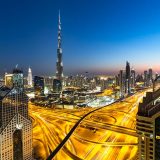The growing emirate of Dubai has retained its position as the top real estate investment destination in the GCC region for quite long time now. In a recent study conducted on GCC home buyers by Real Estate Barometer, about 69% of the respondents to the study chose Dubai as the top destination for real estate investment in the Middle East. Also, 66% of the respondents expected Expo 2020 to have a positive impact on the real estate market in Dubai.
During its emergence as a real estate investment hub over the course of the last decade, Dubai found it bit easy to retain a top position in GCC since there were no other competitive markets in the whole region.
Endeavours of the other oil-dependent GCC states to diversify sources of GDP weren’t as poignant as Dubai’s and UAE’s in general. The emirate pioneered in setting a flexible real estate investment law and was the first to enable freehold ownership on its lands in the GCC region. Moreover, the small emirate worked on a successful long-term strategy to boost its tourism revenues. Now, Dubai is the top touristic destination in the region attracting visitors from other neighbouring states and all around the world.
As a result, the economic diversification policy followed in Dubai paid off. In 2015, the emirate’s mining and quarrying sector, which includes oil revenues, contributed only 2.2% in the GDP. The biggest contributing sector was retail with 29 percent, followed by property with 15 percent.
Dubai success turned the eyes of other states to exploring the opportunities of boosting real estate, tourism, and retail sectors. Following the same track of Dubai, the Kingdom of Bahrain opened the door for real estate foreign investments by defining a number of freehold areas around the kingdom in 2000.
Bahrain made leaps and bounds in its real estate sector. In 2013, the kingdom’s total real estate transactions value exceeded BHD 1 billion for the first time in its history backed by GCC nationals investments, especially Saudi Arabians and Kuwaitis.
Last year, the real estate sector signalled around 5% growth. The kingdom boosted its supply of properties to synch with the rise in demand. A lot of residential and commercial developments were launched over the course of the last 5 years, and still more are in the pipeline.
The displayed Bahrain apartments for rent or sale saw a great increase in demand thanks to the flourishing business activity in the Kingdom that took place as a result of the government’s economic diversification policy. Many mega infrastructure projects are under construction, moreover Bahrain witnessed inaugurating several recreational, hospitality, and shopping destinations lately which put it on the world’s tourism map.
Not only Bahrain, Saudi Arabia also under its new political leadership is seeing radical changes in its economic structure. The crown prince of KSA Prince Mohammed bin Salman Al Saud has launched the promising project of Neom, which is an economic and financial city to be constructed in the border region of Saudi Arabia, Jordan, and Egypt. Neom is a representation of Saudi Arabia’s new orientation towards serious economic reformations for the sake of diversifying GDP incomes and reducing dependency on oil.
The whole region around Dubai is changing, it’s not like 10 years ago and no doubt it won’t be the same after 10 years. Currently, Dubai is far ahead ahead from its neighbours in respect of real estate business, however, the current developments taking place in Saudi Arabia, Bahrain, and other countries could shake its status unless it picks up the pace in its economic development strategy.
Handpicked links
- Best Non Gamstop Casinos
- Best Casino Not On Gamstop
- UK Online Casinos Not On Gamstop
- Casino Sicuri Online Con Bonus
- Non Gamstop Casino
- Casino Not On Gamstop
- UK Online Casinos Not On Gamstop
- Best Online Casino UK
- Canadian Online Casinos
- Best Non Gamstop Casinos
- Betting Sites UK
- Meilleur Casino En Ligne 2025
- オンライン カジノ おすすめ
- UK Casinos Not On Gamstop
- Casino Sites UK Not On Gamstop
- Casino Not On Gamstop
- Non Gamstop Casinos
- Meilleur Casino En Ligne 2025
- Sites Not On Gamstop
- Non Gamstop Casino UK
- Casino Sites Not On Gamstop
- Casino Non Aams
- Casino En Ligne Fiable
- Lista Casino Online Non Aams
- Bitcoin Casinos
- Sites De Paris Sportifs En Belgique
- Bookmaker Non Aams
- Site Paris Sportif Tennis
- Sweet Bonanza Avis
- 稼げるカジノアプリ
- Scommesse Sportive Crypto
- Casino En Ligne Fiable
- Casino En Ligne
- Migliori Crypto Casino
- Meilleur Site De Casino En Ligne
- 비트코인 카지노
- Migliori Crypto Casino
- Casino Non Aams
- Casino En Ligne Sans Wager


